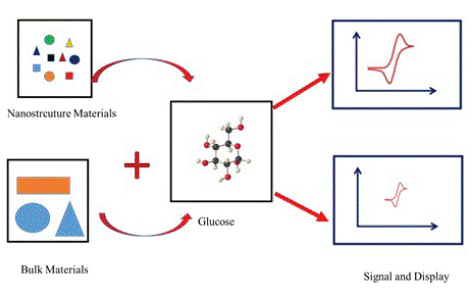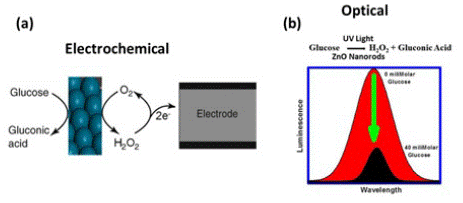
Short Communication
Austin J Biosens & Bioelectron. 2023; 8(1): 1045.
Nanomaterials for Monitoring Glucose in Diabetes
Sarangi SN*
Institute of Physics, P.O: Sainik School, Bhubaneswar, India
*Corresponding author: Sarangi SN Institute of Physics, P.O: Sainik School, Bhubaneswar-751005, India. Email: [email protected]
Received: February 28, 2023 Accepted: April 05, 2023 Published: April 12, 2023
Short Communication
Monitoring blood glucose levels assists diabetics in controlling their condition on a personal level, minimizing the negative effects of numerous other diseases associated with diabetes. Due to the short comings of current diagnostic techniques, many researches are being done to create more accurate ways to test glucose. There has been a huge need for the creation of advanced glucose biosensors for the human society. Research has mainly concentrated on attaining biocompatible and better sensing capabilities in comparison to the current technologies, which opens up new avenues for more effective glucose sensors. These efforts have been impacted by nanotechnology because of the unique properties of nanomaterials such as increase in the surface area of sensors, and enhances the catalytic properties of electrodes. Here, we will review the recent advancements in glucose biosensor based on nanomaterials that enhance the glucose sensor performance.
The major problem of diabetes demands attention which is marked by an elevated blood glucose level [1-3]. According to the World Health Organization (WHO), millions of individuals worldwide, particularly those from middle- or low-income groups, are affected by diabetes mellitus. If left untreated, it could result in serious side effects such kidney failure, blindness, heart attacks, strokes, and limb amputations [4]. Despite the fact that there is no cure for diabetes, people can lessen its side effects by closely monitoring their blood glucose levels. The development of affordable, accurate, and user-friendly glucose monitoring instruments is being sparked by advancements of nanoscience and nanotechnology. Accurate and timely detection based on several kinds of glucose sensor platforms has been made possible by using nanomaterial based biosensors. With the use of nanomaterial based biosensor, the sensing properties enhanced by many fold as shown in the schematic (Figure 1).

Figure 1: Schematic figure for comparison of bulk and nanomaterial based glucose sensors.
Nanomaterials Based Glucose Sensors
The enzyme-based electrochemical glucose sensor is the type that has been studied the most historically. Based on the 1960s-era hypothesis of immobilizing GOx on an electrode, most researchers studied this type of glucose biosensor [5]. The most typical use of nanotechnology for diabetes sensors is the use of nanomaterials to help with the conventional enzymatic electrochemical detection of glucose as shown in (Figure 2). Other glucose identification techniques should be used for optical glucose sensors in the absence of electrodes and the electrochemical process. The use of common enzymes, such GOx, with optical glucose-sensing technologies, particularly fluorescent sensing, is also possible. Photoluminescence quenching is one of the most suitable methods for detection of glucose in human blood serum (Figure 2b) as studied by Sarangi et al. [6]. One of the underlying ideas is that when enzymes or coenzymes bind to glucose, their optical characteristics would alter. Increased surface area, more effective electron transport from enzyme to electrode, and the opportunity to incorporate extra catalytic processes are just a few benefits that come with incorporating nanomaterials into these sensors.

Figure 2: (a) Electrochemical glucose sensor, (b) Optical glucose sensor.
Using the nanomaterials, one may characterise recent advancements in glucose biosensor sector. Porous films, nanoflowers, and nanorods, as well as copper based nanostructures have been studied to demonstrate glucose detection [7-10]. There have been reports of nanoparticles made of silver, gold, nickel, and nickel/palladium, as well as gold, boron-doped diamond, and platinum/lead [11-18] nanoporous networks for glucose detection using electrochemical methods. Moreover, the incorporation of carbon nanomaterials into glucose sensor application enhances sensor performance. Metal nanoparticles with carbon nanofibers or nanotubes [19,20], and fluorine-doped nanotubes [21] have improved oxidation characteristics (such as working potential or sensitivity) when compared to direct oxidation systems with an unmodified electrode which resulted an enhancement in the sensing properties. Similar to this, Kim et al. [22] and Sarangi et al. [6] created an optical glucose sensor using ZnO nanostructures that was both enzymatic and non-enzymatic. In this optical glucose sensor, photoluminescence quenching caused by H2O2 as a result of the oxidation of glucose with GOx caused the PL intensity to decrease with the glucose concentration. The radiative transition of the excited electrons was blocked by the quencher H2O2, which led to the PL quenching. The quantum confinement that aided in the electron transport from ZnO to H2O2 boosted the energies of the valence and conduction band edges. The PL intensity can be utilised as a gauge of the glucose concentration since the amount of PL quenching correlates with the amount of H2O2, which also correlates to the glucose concentration.
We have compiled the recent developments used in glucose sensor applications. The greater lifetime and shorter readout lag of optical glucose sensors have made them a popular alternative to electrochemical sensors in recent years. The most common form of glucose sensors used in the different commercially available glucose monitors nowadays are electrochemical sensors. Although the majority of conventional electrochemical sensors are enzyme-catalyzed, modified electrodes based on nanotechnology, particularly those made of metal, nanoparticles, or graphene, have been developed in an effort to replace the enzyme with electrodes that perform glucose sensing more effectively. Moreover, several of the nanomaterials-based glucose sensors have been used extensively in optical glucose sensors and are thought to be efficient glucose recognition techniques. The optical glucose-sensing method that has received the most research attention in the literature based on photoluminescence/fluorescence technique
References
- E Sehit, Z Altintas. Significance of nanomaterials in electrochemical glucose sensors: An updated review (2016-2020), Biosensors and Bioelectronics. 2020; 159: 112165.
- American Diabetes Association, Diabetes Care. 2013; 36: S67–S74.
- KJ Cash, HA Clark. Nanosensors and nanomaterials for monitoring glucose in diabetes, Trends in Molecular Medicine. 2010; 16: 584-593.
- World Health Organization, Global Report on Diabetes. 2016.
- IB Hirsch, T Battelino, AL Peters, JJ Chamberlain, G Aleppo, et al. Role of Continuous Glucose Monitoring in Diabetes Treatment Arlington: American Diabetes Association. 2018.
- SN Sarangi, S Nozaki, SN Sahu. ZnOnanorod based non-enzymatic optical glucose sensing. J. Biomedical Nanotechnology. 2015; 11: 988-996.
- G Wang, Y Wei, W Zhang, X Zhang, B Fang, et al. Enzyme-free amperometric sensing of glucoseusing Cu-CuO nanowire composites. Microchim Acta. 2010; 168: 87-92.
- S Cherevko, CH Chung. The porous CuO electrode fabricated by hydrogen bubble evolution and its application to highly sensitive non-enzymatic glucose detection. Talanta. 2010; 80: 1371–1377.
- X Wang, C Hu, H Liu, G Du, X He, et al. Synthesis of CuO nanostructures and their application for nonenzymatic glucose sensing. Sensors and Actuators B-Chemical. 2010; 144: 220–225.
- TGS Babu, T Ramachandran. Development of highly sensitive non-enzymatic sensor for the selective determination of glucose and fabrication of a working model. Electrochim Acta. 2010; 55: 1612–1618.
- H Quan, SU Park, J Park. Electrochemical oxidation of glucose on silver nanoparticle-modified composite electrodes. Electrochim Acta. 2010; 55: 2232–2237.
- D Feng, F Wang, Z Chen. Electrochemical glucose sensor based on one-step construction of gold nanoparticle-chitosan composite film. Sensors and Actuators B-Chemical. 2009; 138: 539–544.
- X Wang, Y Zhang, CE Banks, Q Chen, X Ji. Non-enzymatic amperometric glucose biosensor based on nickel hexacyanoferrate nanoparticle film modified electrodes. Colloids and Surfaces B: Biointerfaces. 2010; 78: 363–366.
- F Miao, B Tao, L Sun, T Liu, J You, et al. Amperometric glucose sensor based on 3Dordered nickel-palladium nanomaterial supported by silicon MC Parray. Sensors and Actuators B-Chemical. 2009; 141: 338–342.
- S Cherevko, CH Chung. Gold nanowire array electrode for non-enzymatic voltammetric and amperometric glucose detection. Sensors and Actuators B-Chemical. 2009; 142: 216–223.
- A Safavi, N Maleki, E Farjami. Fabrication of a glucose sensor based on a novel nanocomposite electrode. Biosens Bioelectron. 2009; 24: 1655–1660.
- D Luo, L Wu, J Zhi. Fabrication of boron-doped diamond nanorod forest electrodes and their application in nonenzymatic amperometric glucose biosensing. ACS Nano. 2009; 3: 2121–2128.
- J Wang, DF Thomas, A Chen. Nonenzymatic electrochemical glucose sensor based on nanoporous PtPb networks. Anal Chem. 2008; 80: 997–1004.
- Y Liu, H Teng, H Hou, T You. Nonenzymatic glucose sensor based on renewable electrospun Ni nanoparticle-loaded carbon nanofiber paste electrode. Biosens Bioelectron. 2009; 24: 3329–3334.
- D Rathod, C Dickinson, D Egan, E Dempsey. Platinum nanoparticle decoration of carbonmaterials with applications in non-enzymatic glucose sensing. Sensors and Actuators B-Chemical. 2010; 143: 547–554.
- SY Ly, JH Lee. Human-urine diabetes assay and in vivo rat bladder assay using a fluorine-doped carbon nanotube catheter sensor. Ann Biomed Eng. 2009; 37: 2028–2033.
- KE Kim, TG Kim, YM Sung. Enzyme-conjugated ZnO nanocrystals for collisional quenching-based glucose sensing. Cryst Eng Comm. 2012; 14: 2859-2865.